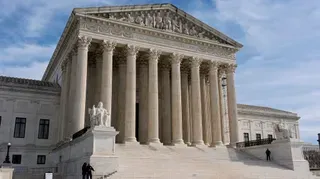June 11, 2015
HHS Chief: Onus on Congress, States if Health Aid Annulled
Michael Cox READ TIME: 3 MIN.
It will be up to Congress and the states to respond should the Supreme Court annul federal subsidies that are a cornerstone of President Barack Obama's health care law, the administration's top health official told Congress on Wednesday.
In her remarks to the Republican-run House Ways and Means Committee, Health and Human Services Secretary Sylvia Burwell underscored the administration's effort to keep pressure on the GOP should that financial assistance be struck down. Republicans run Congress, and 26 of the 34 states likely to be most affected if the subsidies are voided have GOP governors.
Republicans pushed back, chiding the administration for a lack of cooperation, in a hearing that illustrated how Obama's 5-year-old law remains a partisan flashpoint, likely to reverberate through next year's presidential and congressional elections.
The Supreme Court is expected to rule this month on a lawsuit by conservatives asserting that the subsidies that help millions afford health care are legal only in states running their own insurance market places.
In the 34 states using the federal HealthCare.gov website that are expected to be hardest hit if the aid is invalidated, 7.3 million people have signed up for coverage and made initial payments. Of those, about 88 percent�?? 6.4 million people �?? receive federal subsidies averaging $272 monthly.
Should the court annul the aid, "The critical decisions will sit with Congress, the states and governors to determine if those subsidies are available," Burwell said.
The subsidies are disbursed to recipients as tax credits. Should they be eliminated, millions of people could be forced to drop health coverage they'd find too expensive.
Committee Chairman Paul Ryan, R-Wis., repeatedly asked Burwell if Obama would work with lawmakers to overhaul the law "or is he going to put concrete around his ankles and say, 'My law or nothing?' "
Burwell said the administration "is going to do everything we can" to get ready to communicate and work with states.
She said if Congress sends Obama a law that improves "affordability, quality and access, we are open to those things."
Ryan also said recent efforts by insurers to boost premiums are the latest evidence that Obama's health care overhaul law "just doesn't work" and must be replaced.
"Whatever the Supreme Court decides this month, I think the lesson is clear. Obamacare is busted. It just doesn't work. And no quick fix can change this fact," said Ryan, his party's 2012 vice presidential candidate.
Rep. Sander Levin of Michigan, top Democrat on the Ways and Means panel, said the only thing broken is the GOP's attacks on the law.
"You sit as arm-chair critics as millions of people have insurance who never had it before," Levin said. "You're livid because it's getting better?"
Obama said Tuesday that his law was now embedded in the country's health care system and said the court shouldn't have accepted the case. He also mocked "unending Chicken Little warnings" from opponents who warned that the law would abridge people's freedom.
"There's something, I have to say, just deeply cynical about the ceaseless, endless partisan attempts to roll back progress," Obama said at the Catholic Hospital Association conference.
Obama has said a "one-sentence provision" could repair the problem if the court bars subsidies for states without their own marketplaces, but Republicans have rejected that approach.
Instead, top House and Senate Republicans have been working privately toward legislation restoring aid to those losing it until sometime in 2017. It would also eliminate parts of the health overhaul, such as its requirement that companies insure workers. That would almost certainly draw a veto from Obama.
Republican lawmakers say they will unveil their plan once the justices rule, though there are no indications they have united behind a particular plan. They hope a Republican will inhabit the White House in 2017 so they can repeal the current law and enact one less expansive.
According to the most recent figures from Burwell's agency, 10.2 million people nationally have obtained insurance coverage under the health law from state and federal marketplaces and started paying for it.
As insurers begin filing their premium requests for next year with state agencies, some seeking large increases are blaming unexpectedly high costs from covering more patients under the health care law and rising prescription drug prices.
Regulators can block the requested increases in some states while officials can pressure insurers to curb their increases in others.







